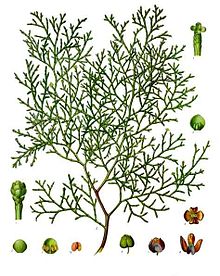- Thyine wood
-
This article incorporates text from Easton's Bible Dictionary (1897), a publication now in the public domain.
Thyine wood is a 15th century English name for a wood, from the tree known botanically as Tetraclinis articulata (syn. Callitris quadrivalvis, Thuja articulata). The name of this wood is derived from the Greek word thuon, "fragrant wood" or thuein, “to sacrifice”, and it was so called because it was burnt in sacrifices, on account of its fragrance.
Another wood from this tree was called citrus, citron wood, by the Romans. This was reckoned very valuable, and was used for making articles of furniture by the Greeks and Romans. Thyine wood is mentioned in the King James Version of the Bible at Rev. 18:12 as being among the articles which would cease to be purchased when Babylon fell. The New International Version translates the passage "citron wood"; the Amplified Bible translates it as "scented wood".
The resin is used as the basis for euparal, a mounting medium used in microscopy.
References
- Smith's Bible dictionary article
- Easton's Bible dictionary article
- An online source for different Bible versions
- Use in microscopy

This article about furniture or furnishing is a stub. You can help Wikipedia by expanding it.

